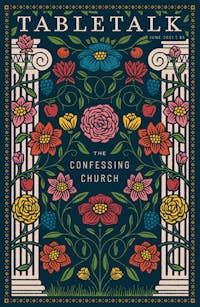
Request your free, three-month trial to Tabletalk magazine. You’ll receive the print issue monthly and gain immediate digital access to decades of archives. This trial is risk-free. No credit card required.
Try Tabletalk NowAlready receive Tabletalk magazine every month?
Verify your email address to gain unlimited access.
About ten years ago, I was asked to write a little book called Why Do We Have Creeds? In answering that question, my aim was to help Christians, particularly those Christians from non-confessional backgrounds, to understand the importance and necessity of creeds and confessions. I myself come from a non-confessional background, and I had never understood how helpful creeds and confessions were until I read the Westminster Standards in 1997, which I heartily affirm to this day. In this issue of Tabletalk, our hope is to call the church to return to her historic creeds and confessions, and to affirm them faithfully—not with mere lip-service, which is becoming increasingly commonplace in the church today.
I offer here a ten-point apologetic of sorts—based on the content from Why Do We Have Creeds?—for the formulation, usefulness, and purpose of the church’s creeds and confessions. The purposes of creeds and confessions are (1) to glorify God and to enjoy Him forever by believing, confessing, and proclaiming our doctrine in accordance with what He has revealed in His Word; (2) to affirm the one true God almighty who has revealed Himself to us and whose attributes, laws, and redemptive work point us to Him as our only Lord so that we might love Him with our entire being; (3) to guard the unchanging, sound doctrine of Scripture against false teachers and heretics outside the church and against false notions of Scripture from within the church; (4) to discern truth from doctrinal error and to discern truth from half-truth; (5) to remain steadfast through the ages until Christ’s return as one, holy, catholic, and Apostolic church that believes, confesses, and proclaims the pure Word of God and that rightly administers the sacraments of baptism and the Lord’s Supper, including the consistent exercise of church discipline; (6) to uphold the life-encompassing doctrine of the inspired and inerrant Word of God as our sole infallible authority for faith and life; (7) to maintain freedom for Christians from extrabiblical laws, traditions, and superstitions that bind people’s consciences; (8) to confirm men according to the church’s doctrinal standard who have been elected to serve as officers of the church and to equip, examine, and prove those men; (9) to preserve the purity and thereby the peace and unity of the church visible as the outward witness of Christ to the world; and (10) to fulfill the Great Commission in our affirmation and proclamation of the one true gospel of Jesus Christ by making disciples, baptizing them in the name of the Father, the Son, and the Holy Spirit and teaching them to observe all that our Lord Jesus Christ commands.
